Report on Entrepreneurship and Small Business Management Overview
VerifiedAdded on 2020/10/22
|23
|7381
|368
Report
AI Summary
This report provides a comprehensive overview of entrepreneurship and small business management. It defines entrepreneurship, explores entrepreneurial ventures, and differentiates between entrepreneurship and entrepreneurial ventures. The report highlights the impact of small businesses on the UK market and their contribution to the social economy. It also examines the characteristics, traits, and skills of successful entrepreneurs, including their motivational mindset. Furthermore, the report identifies various environments that may present opportunities or challenges for entrepreneurs. The report also delves into different types of entrepreneurial ventures, including survival firms, lifestyle entrepreneurship, managed growth firms, public sector enterprises, and social entrepreneurship, while also exploring the similarities and differences between these ventures. The report aims to provide a deep understanding of the key concepts and practical aspects of entrepreneurship.

Entrepreneurship
and
Small Business
Management
and
Small Business
Management
Paraphrase This Document
Need a fresh take? Get an instant paraphrase of this document with our AI Paraphraser
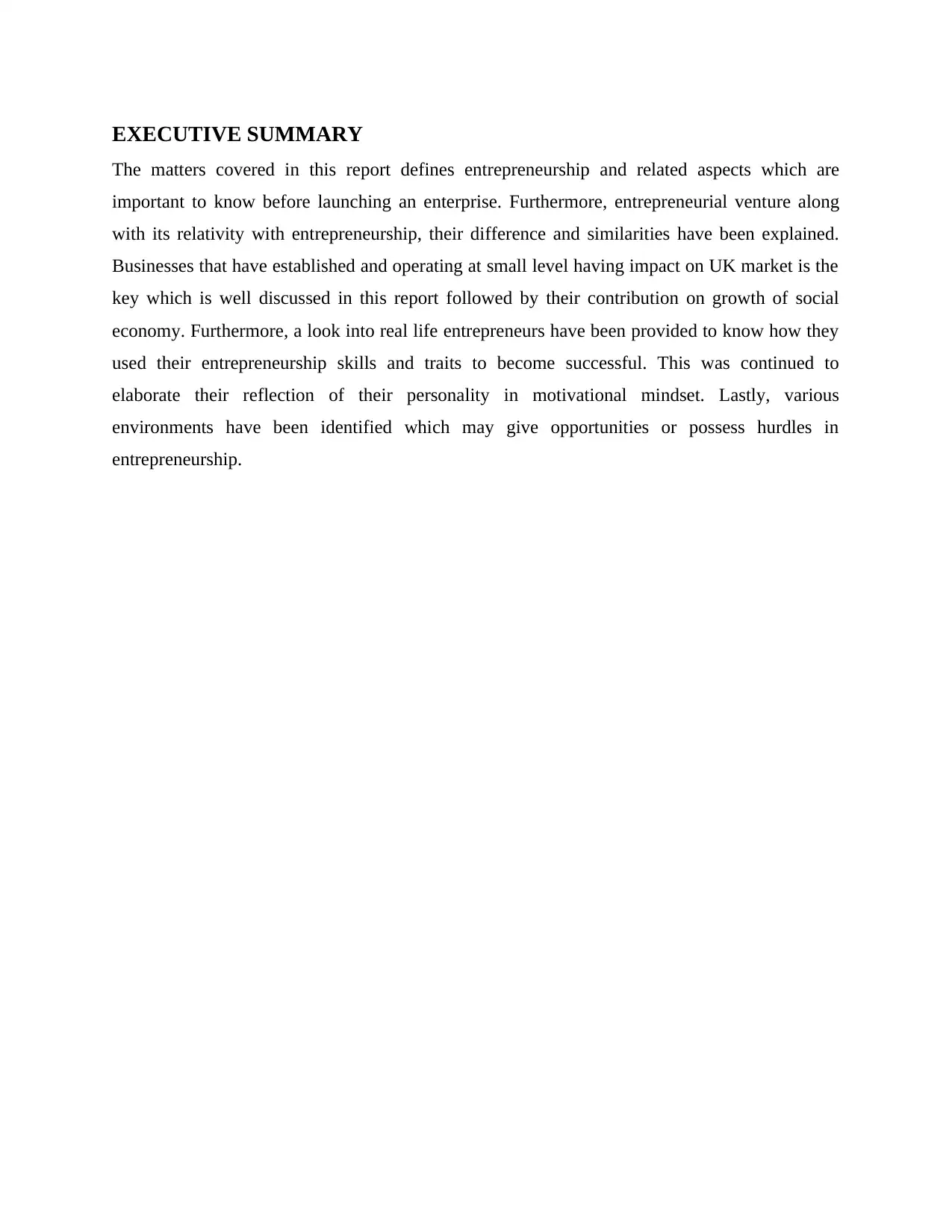
EXECUTIVE SUMMARY
The matters covered in this report defines entrepreneurship and related aspects which are
important to know before launching an enterprise. Furthermore, entrepreneurial venture along
with its relativity with entrepreneurship, their difference and similarities have been explained.
Businesses that have established and operating at small level having impact on UK market is the
key which is well discussed in this report followed by their contribution on growth of social
economy. Furthermore, a look into real life entrepreneurs have been provided to know how they
used their entrepreneurship skills and traits to become successful. This was continued to
elaborate their reflection of their personality in motivational mindset. Lastly, various
environments have been identified which may give opportunities or possess hurdles in
entrepreneurship.
The matters covered in this report defines entrepreneurship and related aspects which are
important to know before launching an enterprise. Furthermore, entrepreneurial venture along
with its relativity with entrepreneurship, their difference and similarities have been explained.
Businesses that have established and operating at small level having impact on UK market is the
key which is well discussed in this report followed by their contribution on growth of social
economy. Furthermore, a look into real life entrepreneurs have been provided to know how they
used their entrepreneurship skills and traits to become successful. This was continued to
elaborate their reflection of their personality in motivational mindset. Lastly, various
environments have been identified which may give opportunities or possess hurdles in
entrepreneurship.
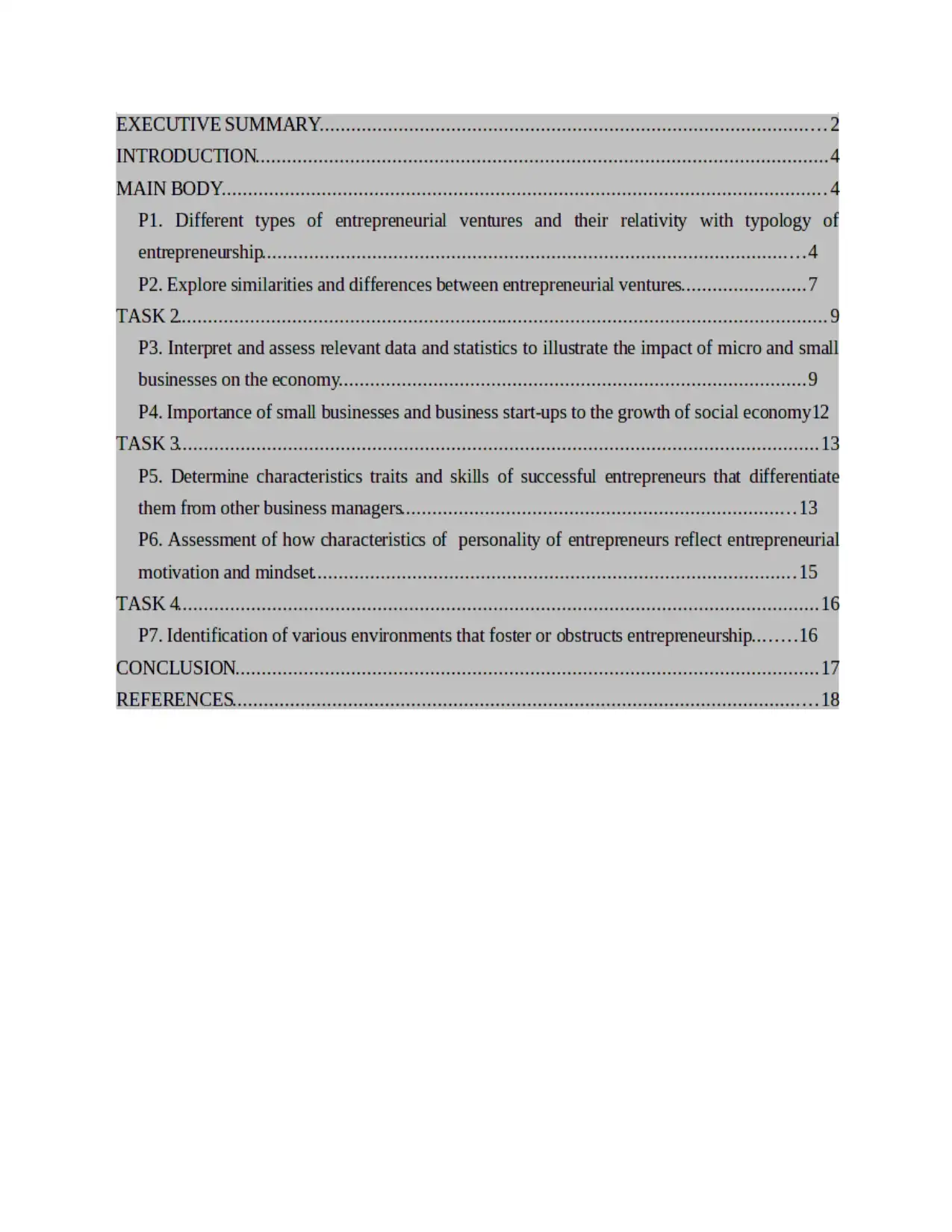
⊘ This is a preview!⊘
Do you want full access?
Subscribe today to unlock all pages.

Trusted by 1+ million students worldwide
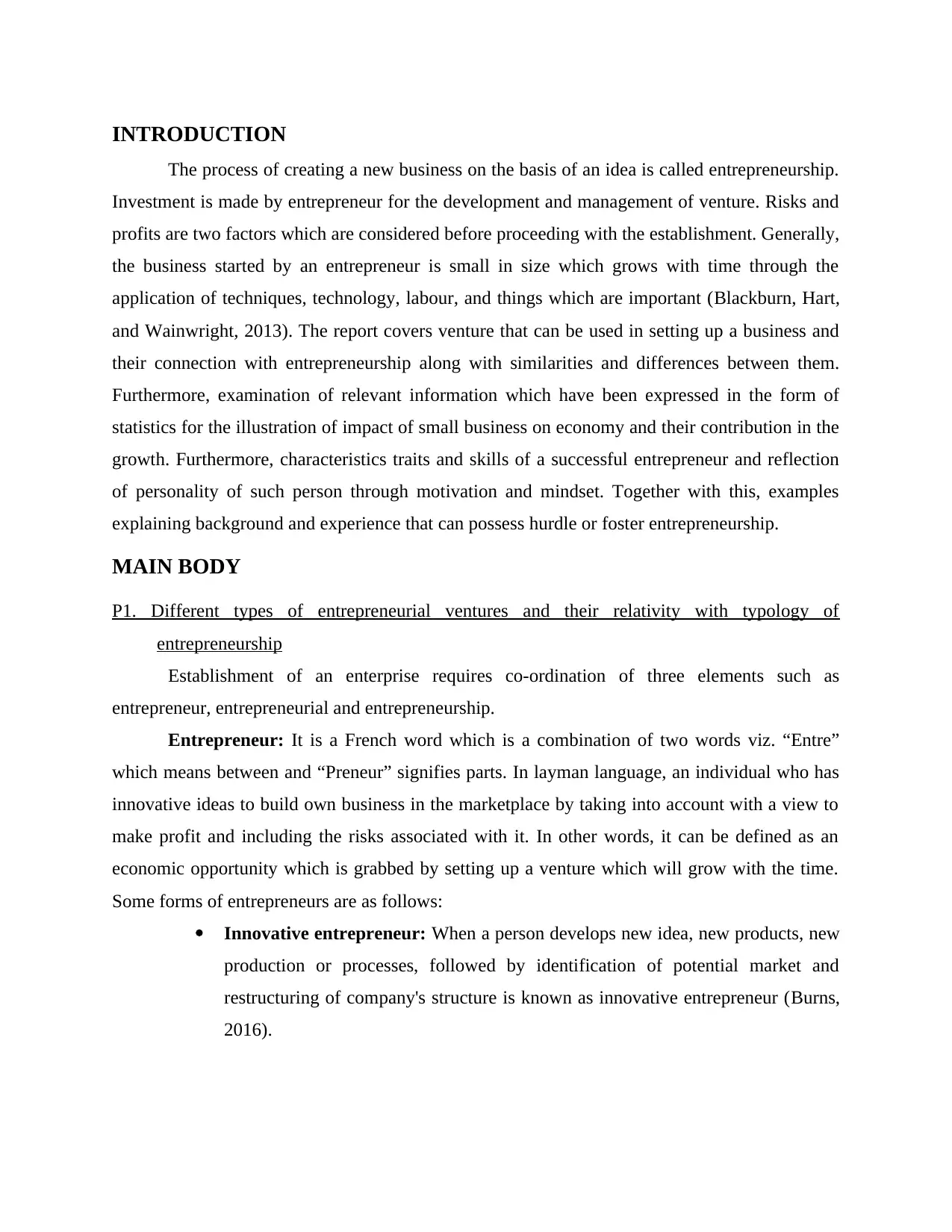
INTRODUCTION
The process of creating a new business on the basis of an idea is called entrepreneurship.
Investment is made by entrepreneur for the development and management of venture. Risks and
profits are two factors which are considered before proceeding with the establishment. Generally,
the business started by an entrepreneur is small in size which grows with time through the
application of techniques, technology, labour, and things which are important (Blackburn, Hart,
and Wainwright, 2013). The report covers venture that can be used in setting up a business and
their connection with entrepreneurship along with similarities and differences between them.
Furthermore, examination of relevant information which have been expressed in the form of
statistics for the illustration of impact of small business on economy and their contribution in the
growth. Furthermore, characteristics traits and skills of a successful entrepreneur and reflection
of personality of such person through motivation and mindset. Together with this, examples
explaining background and experience that can possess hurdle or foster entrepreneurship.
MAIN BODY
P1. Different types of entrepreneurial ventures and their relativity with typology of
entrepreneurship
Establishment of an enterprise requires co-ordination of three elements such as
entrepreneur, entrepreneurial and entrepreneurship.
Entrepreneur: It is a French word which is a combination of two words viz. “Entre”
which means between and “Preneur” signifies parts. In layman language, an individual who has
innovative ideas to build own business in the marketplace by taking into account with a view to
make profit and including the risks associated with it. In other words, it can be defined as an
economic opportunity which is grabbed by setting up a venture which will grow with the time.
Some forms of entrepreneurs are as follows:
Innovative entrepreneur: When a person develops new idea, new products, new
production or processes, followed by identification of potential market and
restructuring of company's structure is known as innovative entrepreneur (Burns,
2016).
The process of creating a new business on the basis of an idea is called entrepreneurship.
Investment is made by entrepreneur for the development and management of venture. Risks and
profits are two factors which are considered before proceeding with the establishment. Generally,
the business started by an entrepreneur is small in size which grows with time through the
application of techniques, technology, labour, and things which are important (Blackburn, Hart,
and Wainwright, 2013). The report covers venture that can be used in setting up a business and
their connection with entrepreneurship along with similarities and differences between them.
Furthermore, examination of relevant information which have been expressed in the form of
statistics for the illustration of impact of small business on economy and their contribution in the
growth. Furthermore, characteristics traits and skills of a successful entrepreneur and reflection
of personality of such person through motivation and mindset. Together with this, examples
explaining background and experience that can possess hurdle or foster entrepreneurship.
MAIN BODY
P1. Different types of entrepreneurial ventures and their relativity with typology of
entrepreneurship
Establishment of an enterprise requires co-ordination of three elements such as
entrepreneur, entrepreneurial and entrepreneurship.
Entrepreneur: It is a French word which is a combination of two words viz. “Entre”
which means between and “Preneur” signifies parts. In layman language, an individual who has
innovative ideas to build own business in the marketplace by taking into account with a view to
make profit and including the risks associated with it. In other words, it can be defined as an
economic opportunity which is grabbed by setting up a venture which will grow with the time.
Some forms of entrepreneurs are as follows:
Innovative entrepreneur: When a person develops new idea, new products, new
production or processes, followed by identification of potential market and
restructuring of company's structure is known as innovative entrepreneur (Burns,
2016).
Paraphrase This Document
Need a fresh take? Get an instant paraphrase of this document with our AI Paraphraser
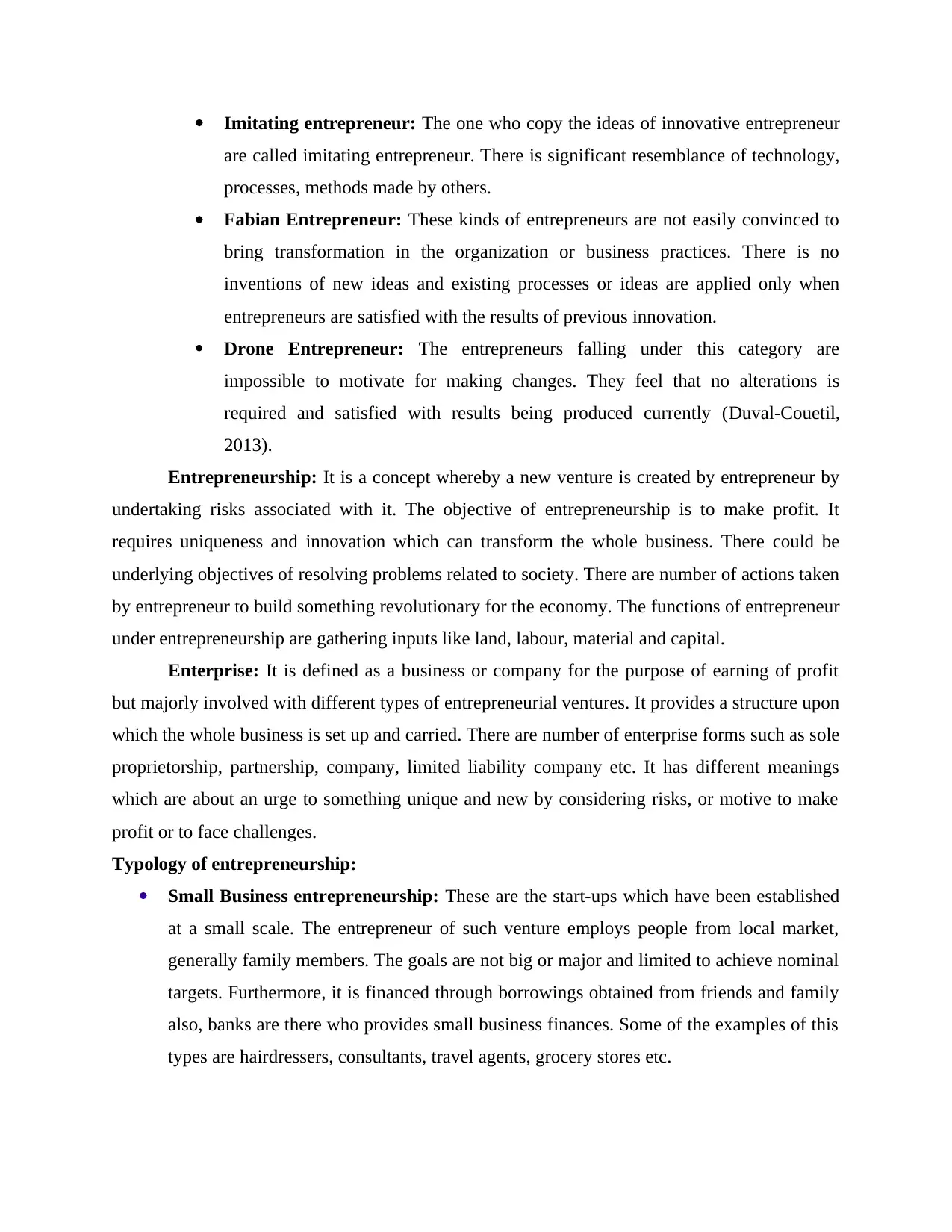
Imitating entrepreneur: The one who copy the ideas of innovative entrepreneur
are called imitating entrepreneur. There is significant resemblance of technology,
processes, methods made by others.
Fabian Entrepreneur: These kinds of entrepreneurs are not easily convinced to
bring transformation in the organization or business practices. There is no
inventions of new ideas and existing processes or ideas are applied only when
entrepreneurs are satisfied with the results of previous innovation.
Drone Entrepreneur: The entrepreneurs falling under this category are
impossible to motivate for making changes. They feel that no alterations is
required and satisfied with results being produced currently (Duval‐Couetil,
2013).
Entrepreneurship: It is a concept whereby a new venture is created by entrepreneur by
undertaking risks associated with it. The objective of entrepreneurship is to make profit. It
requires uniqueness and innovation which can transform the whole business. There could be
underlying objectives of resolving problems related to society. There are number of actions taken
by entrepreneur to build something revolutionary for the economy. The functions of entrepreneur
under entrepreneurship are gathering inputs like land, labour, material and capital.
Enterprise: It is defined as a business or company for the purpose of earning of profit
but majorly involved with different types of entrepreneurial ventures. It provides a structure upon
which the whole business is set up and carried. There are number of enterprise forms such as sole
proprietorship, partnership, company, limited liability company etc. It has different meanings
which are about an urge to something unique and new by considering risks, or motive to make
profit or to face challenges.
Typology of entrepreneurship:
Small Business entrepreneurship: These are the start-ups which have been established
at a small scale. The entrepreneur of such venture employs people from local market,
generally family members. The goals are not big or major and limited to achieve nominal
targets. Furthermore, it is financed through borrowings obtained from friends and family
also, banks are there who provides small business finances. Some of the examples of this
types are hairdressers, consultants, travel agents, grocery stores etc.
are called imitating entrepreneur. There is significant resemblance of technology,
processes, methods made by others.
Fabian Entrepreneur: These kinds of entrepreneurs are not easily convinced to
bring transformation in the organization or business practices. There is no
inventions of new ideas and existing processes or ideas are applied only when
entrepreneurs are satisfied with the results of previous innovation.
Drone Entrepreneur: The entrepreneurs falling under this category are
impossible to motivate for making changes. They feel that no alterations is
required and satisfied with results being produced currently (Duval‐Couetil,
2013).
Entrepreneurship: It is a concept whereby a new venture is created by entrepreneur by
undertaking risks associated with it. The objective of entrepreneurship is to make profit. It
requires uniqueness and innovation which can transform the whole business. There could be
underlying objectives of resolving problems related to society. There are number of actions taken
by entrepreneur to build something revolutionary for the economy. The functions of entrepreneur
under entrepreneurship are gathering inputs like land, labour, material and capital.
Enterprise: It is defined as a business or company for the purpose of earning of profit
but majorly involved with different types of entrepreneurial ventures. It provides a structure upon
which the whole business is set up and carried. There are number of enterprise forms such as sole
proprietorship, partnership, company, limited liability company etc. It has different meanings
which are about an urge to something unique and new by considering risks, or motive to make
profit or to face challenges.
Typology of entrepreneurship:
Small Business entrepreneurship: These are the start-ups which have been established
at a small scale. The entrepreneur of such venture employs people from local market,
generally family members. The goals are not big or major and limited to achieve nominal
targets. Furthermore, it is financed through borrowings obtained from friends and family
also, banks are there who provides small business finances. Some of the examples of this
types are hairdressers, consultants, travel agents, grocery stores etc.
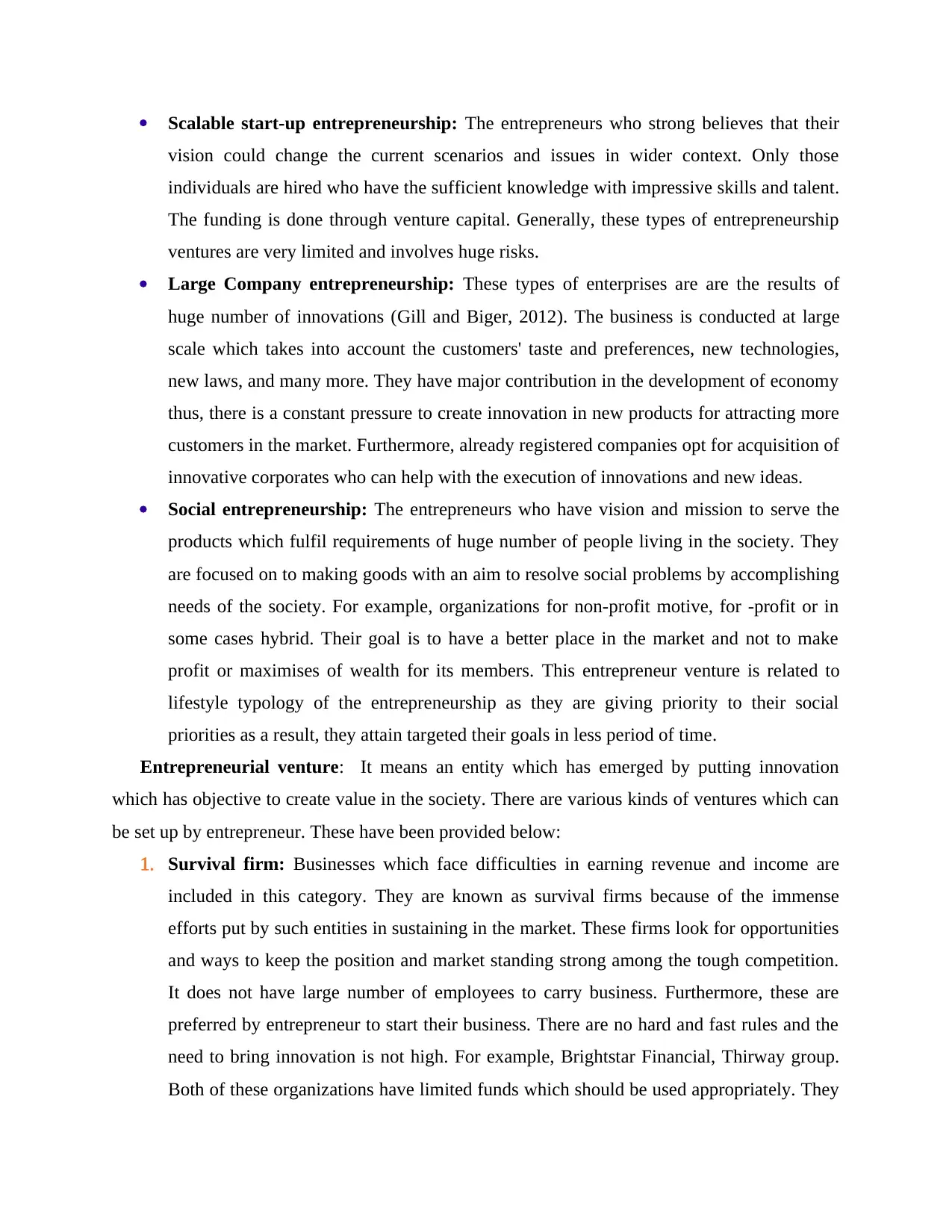
Scalable start-up entrepreneurship: The entrepreneurs who strong believes that their
vision could change the current scenarios and issues in wider context. Only those
individuals are hired who have the sufficient knowledge with impressive skills and talent.
The funding is done through venture capital. Generally, these types of entrepreneurship
ventures are very limited and involves huge risks.
Large Company entrepreneurship: These types of enterprises are are the results of
huge number of innovations (Gill and Biger, 2012). The business is conducted at large
scale which takes into account the customers' taste and preferences, new technologies,
new laws, and many more. They have major contribution in the development of economy
thus, there is a constant pressure to create innovation in new products for attracting more
customers in the market. Furthermore, already registered companies opt for acquisition of
innovative corporates who can help with the execution of innovations and new ideas.
Social entrepreneurship: The entrepreneurs who have vision and mission to serve the
products which fulfil requirements of huge number of people living in the society. They
are focused on to making goods with an aim to resolve social problems by accomplishing
needs of the society. For example, organizations for non-profit motive, for -profit or in
some cases hybrid. Their goal is to have a better place in the market and not to make
profit or maximises of wealth for its members. This entrepreneur venture is related to
lifestyle typology of the entrepreneurship as they are giving priority to their social
priorities as a result, they attain targeted their goals in less period of time.
Entrepreneurial venture: It means an entity which has emerged by putting innovation
which has objective to create value in the society. There are various kinds of ventures which can
be set up by entrepreneur. These have been provided below:
1. Survival firm: Businesses which face difficulties in earning revenue and income are
included in this category. They are known as survival firms because of the immense
efforts put by such entities in sustaining in the market. These firms look for opportunities
and ways to keep the position and market standing strong among the tough competition.
It does not have large number of employees to carry business. Furthermore, these are
preferred by entrepreneur to start their business. There are no hard and fast rules and the
need to bring innovation is not high. For example, Brightstar Financial, Thirway group.
Both of these organizations have limited funds which should be used appropriately. They
vision could change the current scenarios and issues in wider context. Only those
individuals are hired who have the sufficient knowledge with impressive skills and talent.
The funding is done through venture capital. Generally, these types of entrepreneurship
ventures are very limited and involves huge risks.
Large Company entrepreneurship: These types of enterprises are are the results of
huge number of innovations (Gill and Biger, 2012). The business is conducted at large
scale which takes into account the customers' taste and preferences, new technologies,
new laws, and many more. They have major contribution in the development of economy
thus, there is a constant pressure to create innovation in new products for attracting more
customers in the market. Furthermore, already registered companies opt for acquisition of
innovative corporates who can help with the execution of innovations and new ideas.
Social entrepreneurship: The entrepreneurs who have vision and mission to serve the
products which fulfil requirements of huge number of people living in the society. They
are focused on to making goods with an aim to resolve social problems by accomplishing
needs of the society. For example, organizations for non-profit motive, for -profit or in
some cases hybrid. Their goal is to have a better place in the market and not to make
profit or maximises of wealth for its members. This entrepreneur venture is related to
lifestyle typology of the entrepreneurship as they are giving priority to their social
priorities as a result, they attain targeted their goals in less period of time.
Entrepreneurial venture: It means an entity which has emerged by putting innovation
which has objective to create value in the society. There are various kinds of ventures which can
be set up by entrepreneur. These have been provided below:
1. Survival firm: Businesses which face difficulties in earning revenue and income are
included in this category. They are known as survival firms because of the immense
efforts put by such entities in sustaining in the market. These firms look for opportunities
and ways to keep the position and market standing strong among the tough competition.
It does not have large number of employees to carry business. Furthermore, these are
preferred by entrepreneur to start their business. There are no hard and fast rules and the
need to bring innovation is not high. For example, Brightstar Financial, Thirway group.
Both of these organizations have limited funds which should be used appropriately. They
⊘ This is a preview!⊘
Do you want full access?
Subscribe today to unlock all pages.

Trusted by 1+ million students worldwide
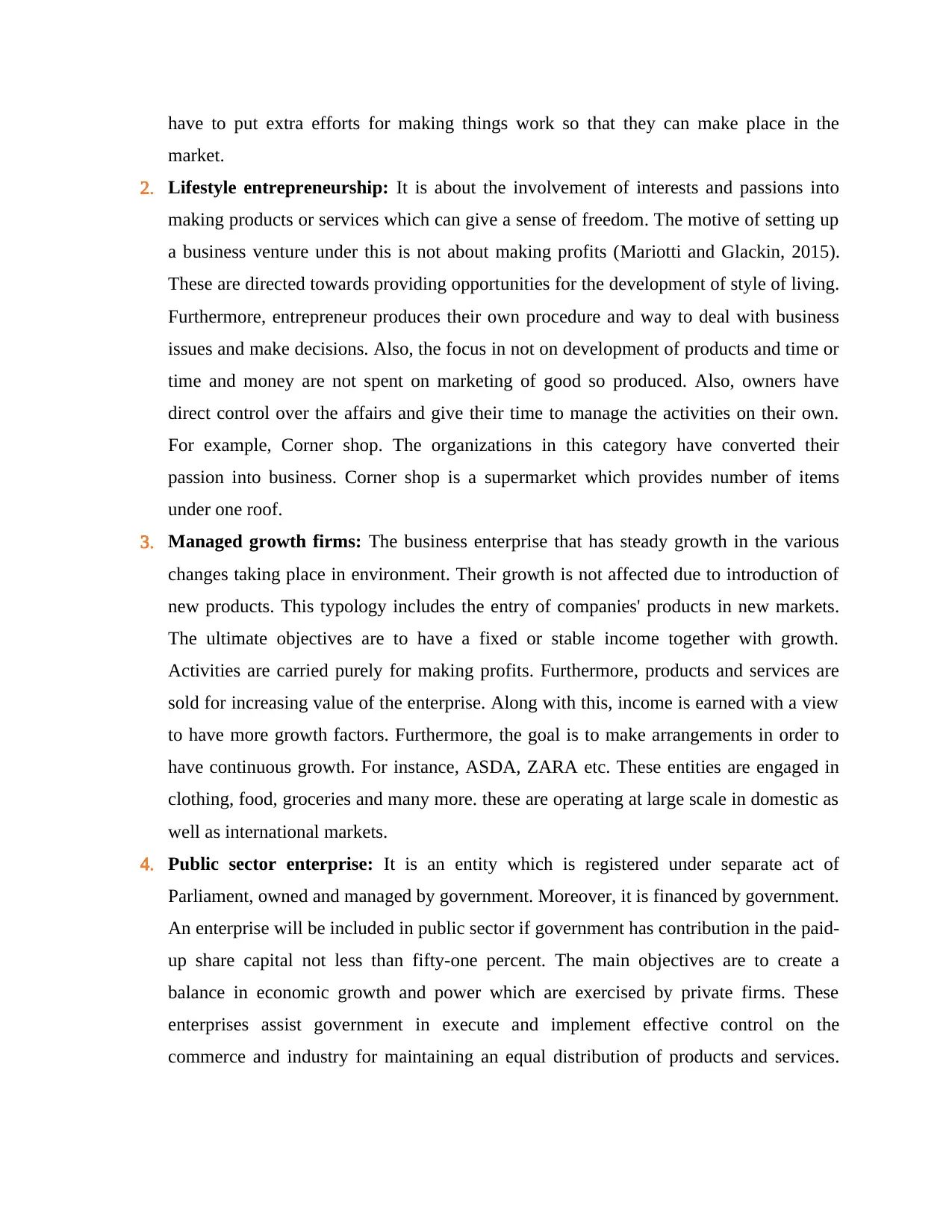
have to put extra efforts for making things work so that they can make place in the
market.
2. Lifestyle entrepreneurship: It is about the involvement of interests and passions into
making products or services which can give a sense of freedom. The motive of setting up
a business venture under this is not about making profits (Mariotti and Glackin, 2015).
These are directed towards providing opportunities for the development of style of living.
Furthermore, entrepreneur produces their own procedure and way to deal with business
issues and make decisions. Also, the focus in not on development of products and time or
time and money are not spent on marketing of good so produced. Also, owners have
direct control over the affairs and give their time to manage the activities on their own.
For example, Corner shop. The organizations in this category have converted their
passion into business. Corner shop is a supermarket which provides number of items
under one roof.
3. Managed growth firms: The business enterprise that has steady growth in the various
changes taking place in environment. Their growth is not affected due to introduction of
new products. This typology includes the entry of companies' products in new markets.
The ultimate objectives are to have a fixed or stable income together with growth.
Activities are carried purely for making profits. Furthermore, products and services are
sold for increasing value of the enterprise. Along with this, income is earned with a view
to have more growth factors. Furthermore, the goal is to make arrangements in order to
have continuous growth. For instance, ASDA, ZARA etc. These entities are engaged in
clothing, food, groceries and many more. these are operating at large scale in domestic as
well as international markets.
4. Public sector enterprise: It is an entity which is registered under separate act of
Parliament, owned and managed by government. Moreover, it is financed by government.
An enterprise will be included in public sector if government has contribution in the paid-
up share capital not less than fifty-one percent. The main objectives are to create a
balance in economic growth and power which are exercised by private firms. These
enterprises assist government in execute and implement effective control on the
commerce and industry for maintaining an equal distribution of products and services.
market.
2. Lifestyle entrepreneurship: It is about the involvement of interests and passions into
making products or services which can give a sense of freedom. The motive of setting up
a business venture under this is not about making profits (Mariotti and Glackin, 2015).
These are directed towards providing opportunities for the development of style of living.
Furthermore, entrepreneur produces their own procedure and way to deal with business
issues and make decisions. Also, the focus in not on development of products and time or
time and money are not spent on marketing of good so produced. Also, owners have
direct control over the affairs and give their time to manage the activities on their own.
For example, Corner shop. The organizations in this category have converted their
passion into business. Corner shop is a supermarket which provides number of items
under one roof.
3. Managed growth firms: The business enterprise that has steady growth in the various
changes taking place in environment. Their growth is not affected due to introduction of
new products. This typology includes the entry of companies' products in new markets.
The ultimate objectives are to have a fixed or stable income together with growth.
Activities are carried purely for making profits. Furthermore, products and services are
sold for increasing value of the enterprise. Along with this, income is earned with a view
to have more growth factors. Furthermore, the goal is to make arrangements in order to
have continuous growth. For instance, ASDA, ZARA etc. These entities are engaged in
clothing, food, groceries and many more. these are operating at large scale in domestic as
well as international markets.
4. Public sector enterprise: It is an entity which is registered under separate act of
Parliament, owned and managed by government. Moreover, it is financed by government.
An enterprise will be included in public sector if government has contribution in the paid-
up share capital not less than fifty-one percent. The main objectives are to create a
balance in economic growth and power which are exercised by private firms. These
enterprises assist government in execute and implement effective control on the
commerce and industry for maintaining an equal distribution of products and services.
Paraphrase This Document
Need a fresh take? Get an instant paraphrase of this document with our AI Paraphraser
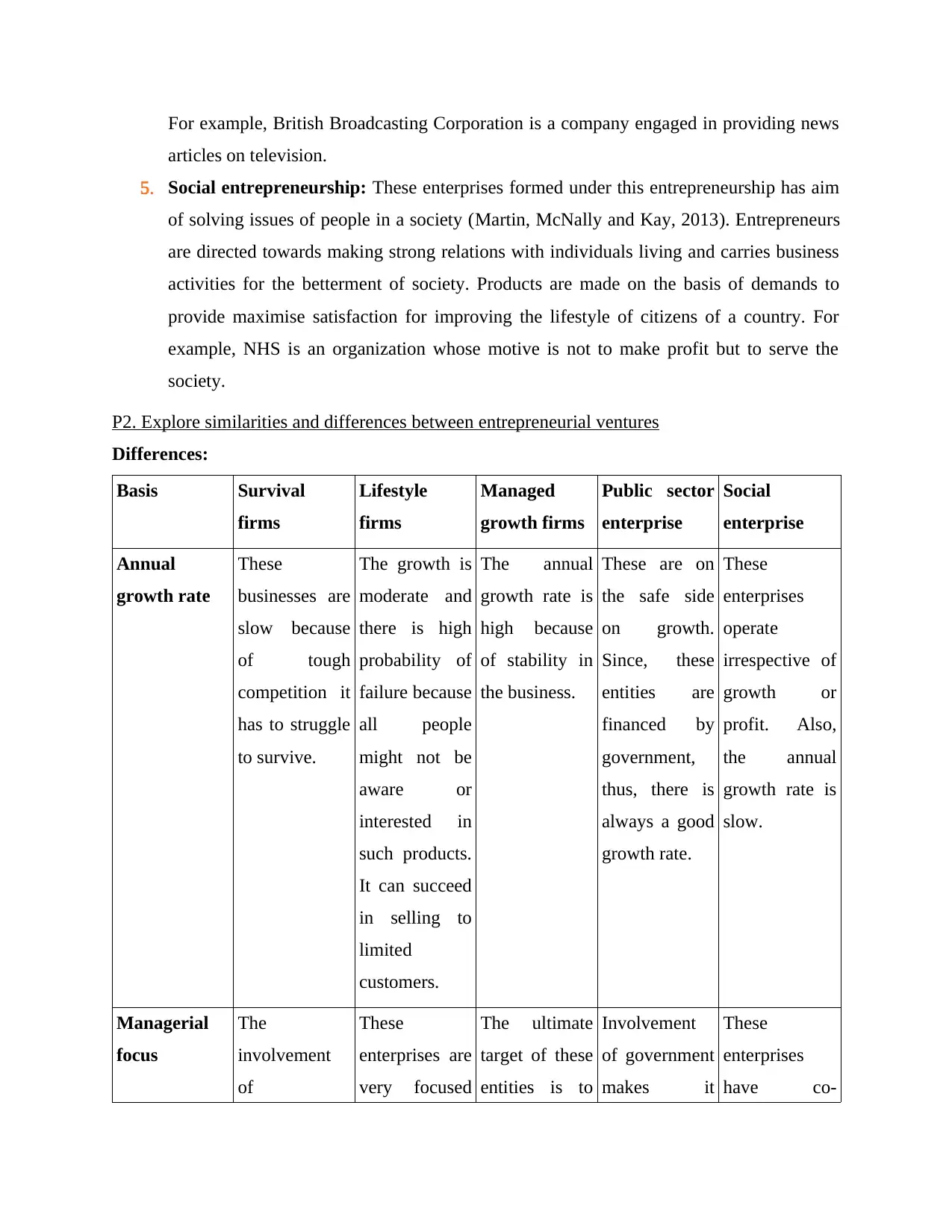
For example, British Broadcasting Corporation is a company engaged in providing news
articles on television.
5. Social entrepreneurship: These enterprises formed under this entrepreneurship has aim
of solving issues of people in a society (Martin, McNally and Kay, 2013). Entrepreneurs
are directed towards making strong relations with individuals living and carries business
activities for the betterment of society. Products are made on the basis of demands to
provide maximise satisfaction for improving the lifestyle of citizens of a country. For
example, NHS is an organization whose motive is not to make profit but to serve the
society.
P2. Explore similarities and differences between entrepreneurial ventures
Differences:
Basis Survival
firms
Lifestyle
firms
Managed
growth firms
Public sector
enterprise
Social
enterprise
Annual
growth rate
These
businesses are
slow because
of tough
competition it
has to struggle
to survive.
The growth is
moderate and
there is high
probability of
failure because
all people
might not be
aware or
interested in
such products.
It can succeed
in selling to
limited
customers.
The annual
growth rate is
high because
of stability in
the business.
These are on
the safe side
on growth.
Since, these
entities are
financed by
government,
thus, there is
always a good
growth rate.
These
enterprises
operate
irrespective of
growth or
profit. Also,
the annual
growth rate is
slow.
Managerial
focus
The
involvement
of
These
enterprises are
very focused
The ultimate
target of these
entities is to
Involvement
of government
makes it
These
enterprises
have co-
articles on television.
5. Social entrepreneurship: These enterprises formed under this entrepreneurship has aim
of solving issues of people in a society (Martin, McNally and Kay, 2013). Entrepreneurs
are directed towards making strong relations with individuals living and carries business
activities for the betterment of society. Products are made on the basis of demands to
provide maximise satisfaction for improving the lifestyle of citizens of a country. For
example, NHS is an organization whose motive is not to make profit but to serve the
society.
P2. Explore similarities and differences between entrepreneurial ventures
Differences:
Basis Survival
firms
Lifestyle
firms
Managed
growth firms
Public sector
enterprise
Social
enterprise
Annual
growth rate
These
businesses are
slow because
of tough
competition it
has to struggle
to survive.
The growth is
moderate and
there is high
probability of
failure because
all people
might not be
aware or
interested in
such products.
It can succeed
in selling to
limited
customers.
The annual
growth rate is
high because
of stability in
the business.
These are on
the safe side
on growth.
Since, these
entities are
financed by
government,
thus, there is
always a good
growth rate.
These
enterprises
operate
irrespective of
growth or
profit. Also,
the annual
growth rate is
slow.
Managerial
focus
The
involvement
of
These
enterprises are
very focused
The ultimate
target of these
entities is to
Involvement
of government
makes it
These
enterprises
have co-
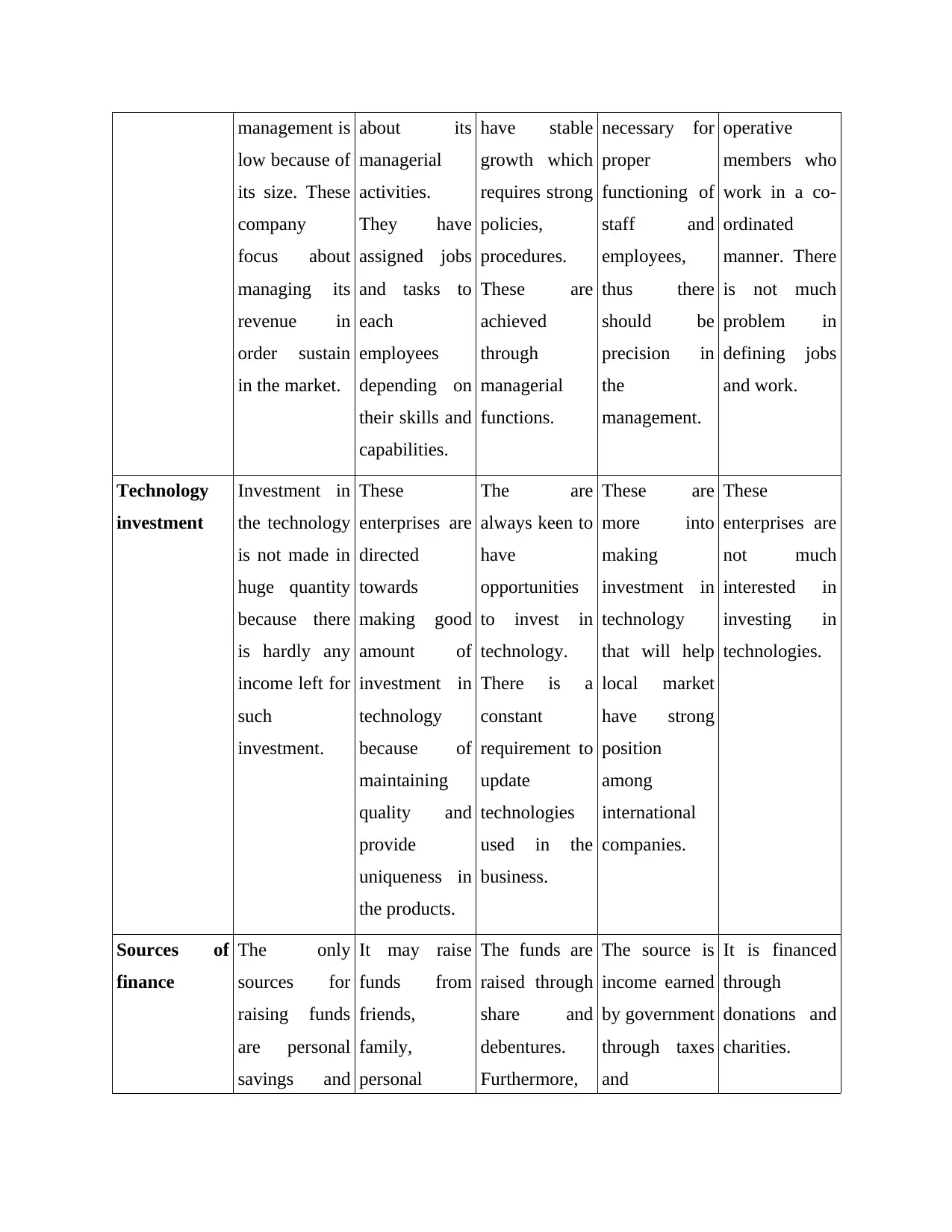
management is
low because of
its size. These
company
focus about
managing its
revenue in
order sustain
in the market.
about its
managerial
activities.
They have
assigned jobs
and tasks to
each
employees
depending on
their skills and
capabilities.
have stable
growth which
requires strong
policies,
procedures.
These are
achieved
through
managerial
functions.
necessary for
proper
functioning of
staff and
employees,
thus there
should be
precision in
the
management.
operative
members who
work in a co-
ordinated
manner. There
is not much
problem in
defining jobs
and work.
Technology
investment
Investment in
the technology
is not made in
huge quantity
because there
is hardly any
income left for
such
investment.
These
enterprises are
directed
towards
making good
amount of
investment in
technology
because of
maintaining
quality and
provide
uniqueness in
the products.
The are
always keen to
have
opportunities
to invest in
technology.
There is a
constant
requirement to
update
technologies
used in the
business.
These are
more into
making
investment in
technology
that will help
local market
have strong
position
among
international
companies.
These
enterprises are
not much
interested in
investing in
technologies.
Sources of
finance
The only
sources for
raising funds
are personal
savings and
It may raise
funds from
friends,
family,
personal
The funds are
raised through
share and
debentures.
Furthermore,
The source is
income earned
by government
through taxes
and
It is financed
through
donations and
charities.
low because of
its size. These
company
focus about
managing its
revenue in
order sustain
in the market.
about its
managerial
activities.
They have
assigned jobs
and tasks to
each
employees
depending on
their skills and
capabilities.
have stable
growth which
requires strong
policies,
procedures.
These are
achieved
through
managerial
functions.
necessary for
proper
functioning of
staff and
employees,
thus there
should be
precision in
the
management.
operative
members who
work in a co-
ordinated
manner. There
is not much
problem in
defining jobs
and work.
Technology
investment
Investment in
the technology
is not made in
huge quantity
because there
is hardly any
income left for
such
investment.
These
enterprises are
directed
towards
making good
amount of
investment in
technology
because of
maintaining
quality and
provide
uniqueness in
the products.
The are
always keen to
have
opportunities
to invest in
technology.
There is a
constant
requirement to
update
technologies
used in the
business.
These are
more into
making
investment in
technology
that will help
local market
have strong
position
among
international
companies.
These
enterprises are
not much
interested in
investing in
technologies.
Sources of
finance
The only
sources for
raising funds
are personal
savings and
It may raise
funds from
friends,
family,
personal
The funds are
raised through
share and
debentures.
Furthermore,
The source is
income earned
by government
through taxes
and
It is financed
through
donations and
charities.
⊘ This is a preview!⊘
Do you want full access?
Subscribe today to unlock all pages.

Trusted by 1+ million students worldwide
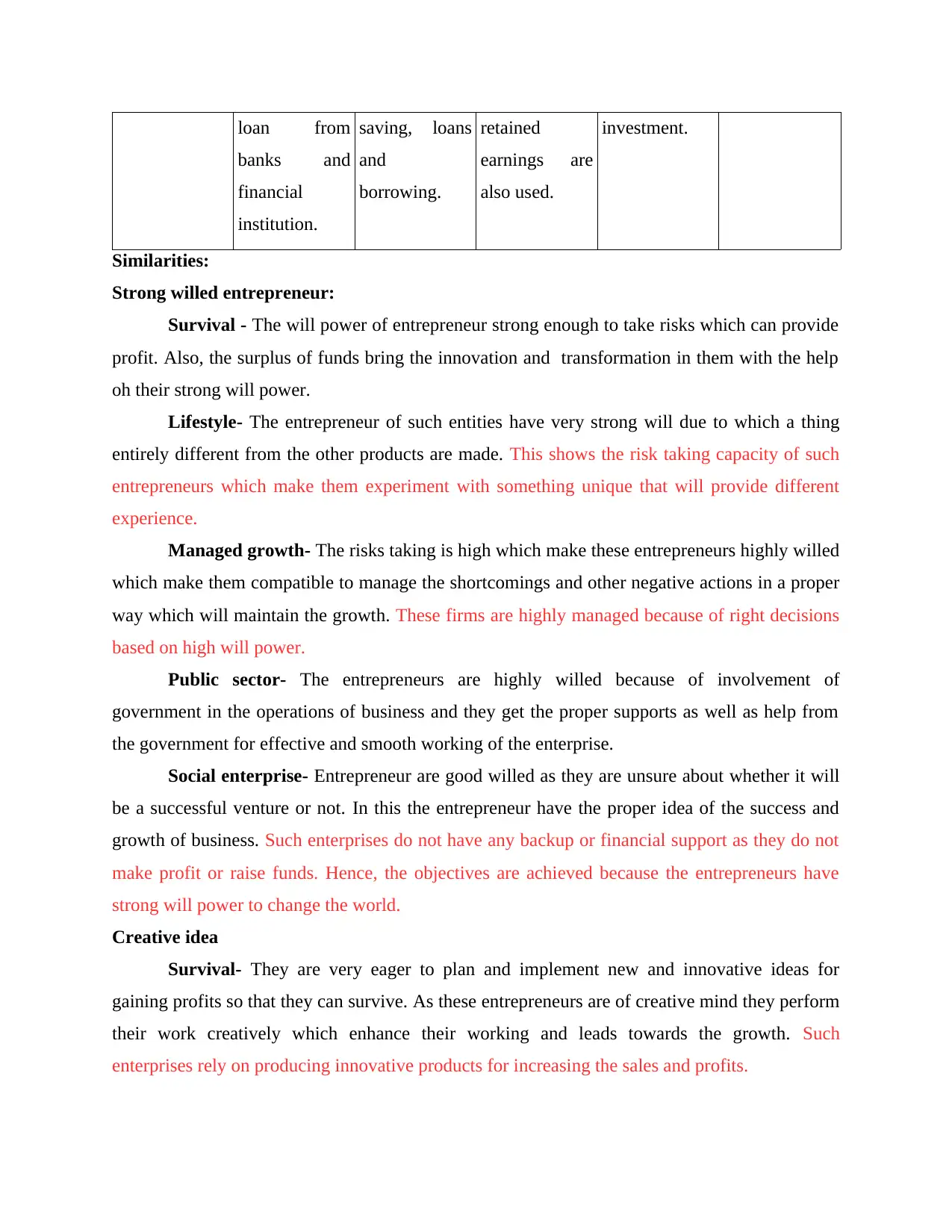
loan from
banks and
financial
institution.
saving, loans
and
borrowing.
retained
earnings are
also used.
investment.
Similarities:
Strong willed entrepreneur:
Survival - The will power of entrepreneur strong enough to take risks which can provide
profit. Also, the surplus of funds bring the innovation and transformation in them with the help
oh their strong will power.
Lifestyle- The entrepreneur of such entities have very strong will due to which a thing
entirely different from the other products are made. This shows the risk taking capacity of such
entrepreneurs which make them experiment with something unique that will provide different
experience.
Managed growth- The risks taking is high which make these entrepreneurs highly willed
which make them compatible to manage the shortcomings and other negative actions in a proper
way which will maintain the growth. These firms are highly managed because of right decisions
based on high will power.
Public sector- The entrepreneurs are highly willed because of involvement of
government in the operations of business and they get the proper supports as well as help from
the government for effective and smooth working of the enterprise.
Social enterprise- Entrepreneur are good willed as they are unsure about whether it will
be a successful venture or not. In this the entrepreneur have the proper idea of the success and
growth of business. Such enterprises do not have any backup or financial support as they do not
make profit or raise funds. Hence, the objectives are achieved because the entrepreneurs have
strong will power to change the world.
Creative idea
Survival- They are very eager to plan and implement new and innovative ideas for
gaining profits so that they can survive. As these entrepreneurs are of creative mind they perform
their work creatively which enhance their working and leads towards the growth. Such
enterprises rely on producing innovative products for increasing the sales and profits.
banks and
financial
institution.
saving, loans
and
borrowing.
retained
earnings are
also used.
investment.
Similarities:
Strong willed entrepreneur:
Survival - The will power of entrepreneur strong enough to take risks which can provide
profit. Also, the surplus of funds bring the innovation and transformation in them with the help
oh their strong will power.
Lifestyle- The entrepreneur of such entities have very strong will due to which a thing
entirely different from the other products are made. This shows the risk taking capacity of such
entrepreneurs which make them experiment with something unique that will provide different
experience.
Managed growth- The risks taking is high which make these entrepreneurs highly willed
which make them compatible to manage the shortcomings and other negative actions in a proper
way which will maintain the growth. These firms are highly managed because of right decisions
based on high will power.
Public sector- The entrepreneurs are highly willed because of involvement of
government in the operations of business and they get the proper supports as well as help from
the government for effective and smooth working of the enterprise.
Social enterprise- Entrepreneur are good willed as they are unsure about whether it will
be a successful venture or not. In this the entrepreneur have the proper idea of the success and
growth of business. Such enterprises do not have any backup or financial support as they do not
make profit or raise funds. Hence, the objectives are achieved because the entrepreneurs have
strong will power to change the world.
Creative idea
Survival- They are very eager to plan and implement new and innovative ideas for
gaining profits so that they can survive. As these entrepreneurs are of creative mind they perform
their work creatively which enhance their working and leads towards the growth. Such
enterprises rely on producing innovative products for increasing the sales and profits.
Paraphrase This Document
Need a fresh take? Get an instant paraphrase of this document with our AI Paraphraser
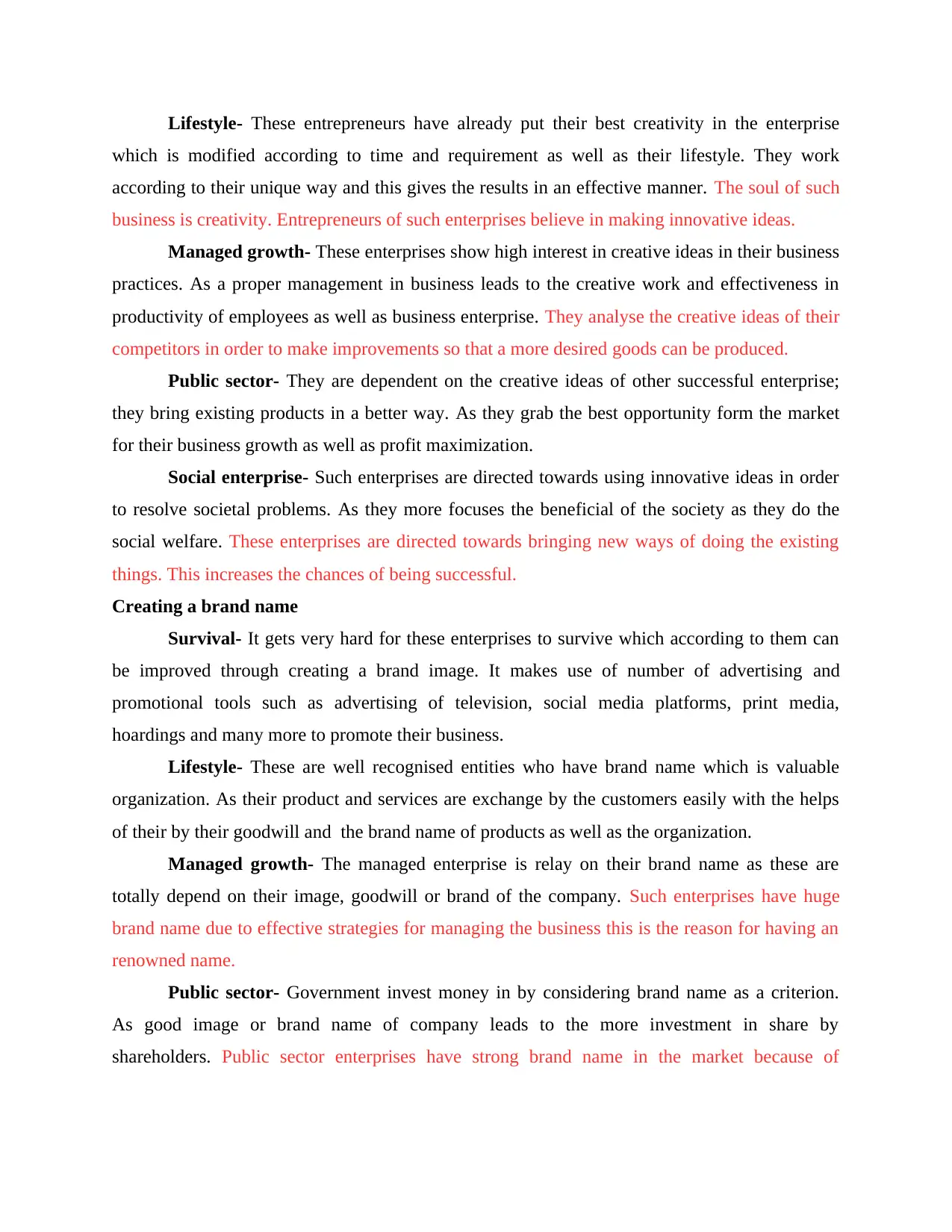
Lifestyle- These entrepreneurs have already put their best creativity in the enterprise
which is modified according to time and requirement as well as their lifestyle. They work
according to their unique way and this gives the results in an effective manner. The soul of such
business is creativity. Entrepreneurs of such enterprises believe in making innovative ideas.
Managed growth- These enterprises show high interest in creative ideas in their business
practices. As a proper management in business leads to the creative work and effectiveness in
productivity of employees as well as business enterprise. They analyse the creative ideas of their
competitors in order to make improvements so that a more desired goods can be produced.
Public sector- They are dependent on the creative ideas of other successful enterprise;
they bring existing products in a better way. As they grab the best opportunity form the market
for their business growth as well as profit maximization.
Social enterprise- Such enterprises are directed towards using innovative ideas in order
to resolve societal problems. As they more focuses the beneficial of the society as they do the
social welfare. These enterprises are directed towards bringing new ways of doing the existing
things. This increases the chances of being successful.
Creating a brand name
Survival- It gets very hard for these enterprises to survive which according to them can
be improved through creating a brand image. It makes use of number of advertising and
promotional tools such as advertising of television, social media platforms, print media,
hoardings and many more to promote their business.
Lifestyle- These are well recognised entities who have brand name which is valuable
organization. As their product and services are exchange by the customers easily with the helps
of their by their goodwill and the brand name of products as well as the organization.
Managed growth- The managed enterprise is relay on their brand name as these are
totally depend on their image, goodwill or brand of the company. Such enterprises have huge
brand name due to effective strategies for managing the business this is the reason for having an
renowned name.
Public sector- Government invest money in by considering brand name as a criterion.
As good image or brand name of company leads to the more investment in share by
shareholders. Public sector enterprises have strong brand name in the market because of
which is modified according to time and requirement as well as their lifestyle. They work
according to their unique way and this gives the results in an effective manner. The soul of such
business is creativity. Entrepreneurs of such enterprises believe in making innovative ideas.
Managed growth- These enterprises show high interest in creative ideas in their business
practices. As a proper management in business leads to the creative work and effectiveness in
productivity of employees as well as business enterprise. They analyse the creative ideas of their
competitors in order to make improvements so that a more desired goods can be produced.
Public sector- They are dependent on the creative ideas of other successful enterprise;
they bring existing products in a better way. As they grab the best opportunity form the market
for their business growth as well as profit maximization.
Social enterprise- Such enterprises are directed towards using innovative ideas in order
to resolve societal problems. As they more focuses the beneficial of the society as they do the
social welfare. These enterprises are directed towards bringing new ways of doing the existing
things. This increases the chances of being successful.
Creating a brand name
Survival- It gets very hard for these enterprises to survive which according to them can
be improved through creating a brand image. It makes use of number of advertising and
promotional tools such as advertising of television, social media platforms, print media,
hoardings and many more to promote their business.
Lifestyle- These are well recognised entities who have brand name which is valuable
organization. As their product and services are exchange by the customers easily with the helps
of their by their goodwill and the brand name of products as well as the organization.
Managed growth- The managed enterprise is relay on their brand name as these are
totally depend on their image, goodwill or brand of the company. Such enterprises have huge
brand name due to effective strategies for managing the business this is the reason for having an
renowned name.
Public sector- Government invest money in by considering brand name as a criterion.
As good image or brand name of company leads to the more investment in share by
shareholders. Public sector enterprises have strong brand name in the market because of
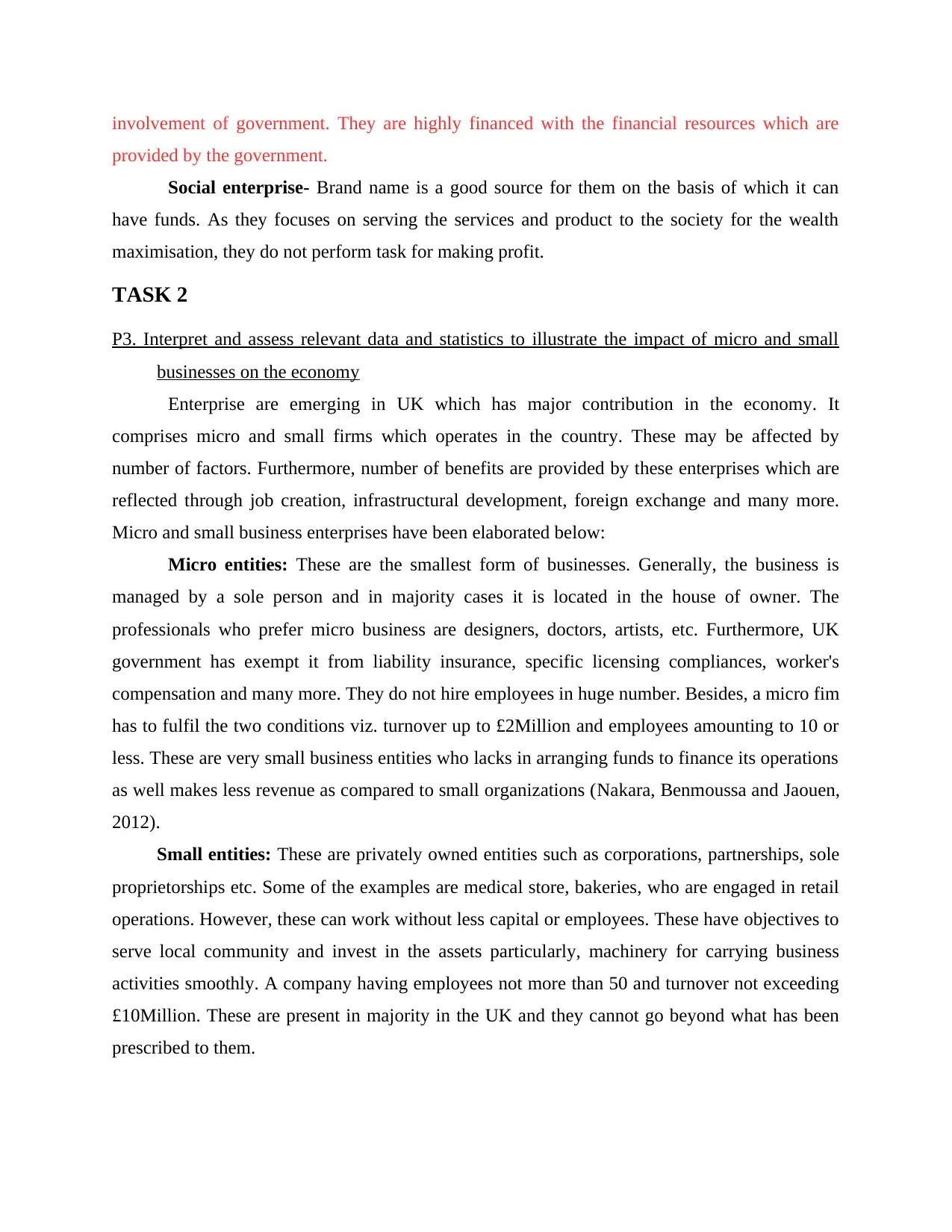
involvement of government. They are highly financed with the financial resources which are
provided by the government.
Social enterprise- Brand name is a good source for them on the basis of which it can
have funds. As they focuses on serving the services and product to the society for the wealth
maximisation, they do not perform task for making profit.
TASK 2
P3. Interpret and assess relevant data and statistics to illustrate the impact of micro and small
businesses on the economy
Enterprise are emerging in UK which has major contribution in the economy. It
comprises micro and small firms which operates in the country. These may be affected by
number of factors. Furthermore, number of benefits are provided by these enterprises which are
reflected through job creation, infrastructural development, foreign exchange and many more.
Micro and small business enterprises have been elaborated below:
Micro entities: These are the smallest form of businesses. Generally, the business is
managed by a sole person and in majority cases it is located in the house of owner. The
professionals who prefer micro business are designers, doctors, artists, etc. Furthermore, UK
government has exempt it from liability insurance, specific licensing compliances, worker's
compensation and many more. They do not hire employees in huge number. Besides, a micro fim
has to fulfil the two conditions viz. turnover up to £2Million and employees amounting to 10 or
less. These are very small business entities who lacks in arranging funds to finance its operations
as well makes less revenue as compared to small organizations (Nakara, Benmoussa and Jaouen,
2012).
Small entities: These are privately owned entities such as corporations, partnerships, sole
proprietorships etc. Some of the examples are medical store, bakeries, who are engaged in retail
operations. However, these can work without less capital or employees. These have objectives to
serve local community and invest in the assets particularly, machinery for carrying business
activities smoothly. A company having employees not more than 50 and turnover not exceeding
£10Million. These are present in majority in the UK and they cannot go beyond what has been
prescribed to them.
provided by the government.
Social enterprise- Brand name is a good source for them on the basis of which it can
have funds. As they focuses on serving the services and product to the society for the wealth
maximisation, they do not perform task for making profit.
TASK 2
P3. Interpret and assess relevant data and statistics to illustrate the impact of micro and small
businesses on the economy
Enterprise are emerging in UK which has major contribution in the economy. It
comprises micro and small firms which operates in the country. These may be affected by
number of factors. Furthermore, number of benefits are provided by these enterprises which are
reflected through job creation, infrastructural development, foreign exchange and many more.
Micro and small business enterprises have been elaborated below:
Micro entities: These are the smallest form of businesses. Generally, the business is
managed by a sole person and in majority cases it is located in the house of owner. The
professionals who prefer micro business are designers, doctors, artists, etc. Furthermore, UK
government has exempt it from liability insurance, specific licensing compliances, worker's
compensation and many more. They do not hire employees in huge number. Besides, a micro fim
has to fulfil the two conditions viz. turnover up to £2Million and employees amounting to 10 or
less. These are very small business entities who lacks in arranging funds to finance its operations
as well makes less revenue as compared to small organizations (Nakara, Benmoussa and Jaouen,
2012).
Small entities: These are privately owned entities such as corporations, partnerships, sole
proprietorships etc. Some of the examples are medical store, bakeries, who are engaged in retail
operations. However, these can work without less capital or employees. These have objectives to
serve local community and invest in the assets particularly, machinery for carrying business
activities smoothly. A company having employees not more than 50 and turnover not exceeding
£10Million. These are present in majority in the UK and they cannot go beyond what has been
prescribed to them.
⊘ This is a preview!⊘
Do you want full access?
Subscribe today to unlock all pages.

Trusted by 1+ million students worldwide
1 out of 23
Related Documents
Your All-in-One AI-Powered Toolkit for Academic Success.
+13062052269
info@desklib.com
Available 24*7 on WhatsApp / Email
![[object Object]](/_next/static/media/star-bottom.7253800d.svg)
Unlock your academic potential
Copyright © 2020–2026 A2Z Services. All Rights Reserved. Developed and managed by ZUCOL.





